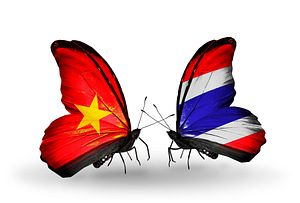With barely more than a year-and-a-half left before the ASEAN Economic Community (AEC) is launched supporters of the trading bloc should be forgiven for assuming authorities are working hard at harmonizing relations and cross cultural differences before the main event.
Not quite.
Thai immigration officials have provoked a political storm with warning signs at customs posts ranking Vietnam alongside 10 potentially troublesome countries, including Afghanistan, Pakistan, North Korea, Iran and Saudi Arabia and demanding their citizens show proof that they are carrying at least $700 before entering Thailand.
The Vietnamese are naturally furious. According to state press reports Nguyen Manh Hung, spokesman for the Saigon Volkswagen Club, felt like he was posing for a mugshot when he was forced to stand in front of a webcam.
Last week he was forced to cover half of his face with $700, or 20,000 baht, worth of banknotes for immigration officers to take a photo of him. This was at the Poipet border gate dividing Thailand and Cambodia.
The Saigon Volkswagen Club was on group trip to Thailand and were horrified by a warning sign stating that Vietnamese along with some Middle East and South Asian countries “might be questioned by the officers due to the policy.”
No explanation of the policy was mentioned nor were any other ASEAN countries included among the nations listed for special attention.
“All of us had to hold the notes in front of our faces to be photographed as if we were criminals who had been caught red-handed,” Hung was quoted as saying.
Those without cash could use credit and bank cards.
Similar complaints emerged from the Arayaprathet side of the border crossing, from where one Vietnamese publication reported Thai customs had behaved “imperiously” and “rudely.” There are also calls for a boycott of Thailand and Thai made goods.
The Vietnam National Administration of Tourism is expected to lodge a complaint over the regulations, which according to Than Nien News were introduced because “Vietnamese entered Thailand as tourists to commit crimes and work illegally (particularly in prostitution).”
Perhaps ironically, the regulations were also instigated after Thai officials cheered a return of confidence in their tourism market, with Vietnamese numbers rising steadily since the anti-government protests on March 3.
That confidence followed an “extensive and vigorously marketed promotion” in Ho Chi Minh City, in conjunction with Vietnamese tour groups aimed at getting Vietnamese travelers back into Thailand.
Thai officials attempted to make themselves heard over the regulations which they say apply to everyone. However, their insistence was contradicted by the signage signaling out 10 nationalities for special treatment – and no one could say how many Afghans, North Koreans or Sudanese regularly crossed the Thai-Cambodian border.
Unwanted neighborly spats, religious and and cultural differences have surfaced ahead of the AEC which is supposed to turn the 10 nations of ASEAN into a single market with a single production base resulting in widespread labor migration for certain industries.
Last week Brunei stunned the international community with its introduction of Sharia Law, anathema in communist countries like Vietnam and Laos, while religious and ethnic conflicts are ongoing in Southern Thailand, the Philippines and Myanmar.
Smaller countries within the ASEAN have complained they are unlikely to be ready in time for the AEC’s launch and the recent regulations imposed by Thailand seems to indicate that ASEAN’s stronger members also have some way to go.
Luke Hunt can be followed on Twitter @lukeanthonyhunt

































